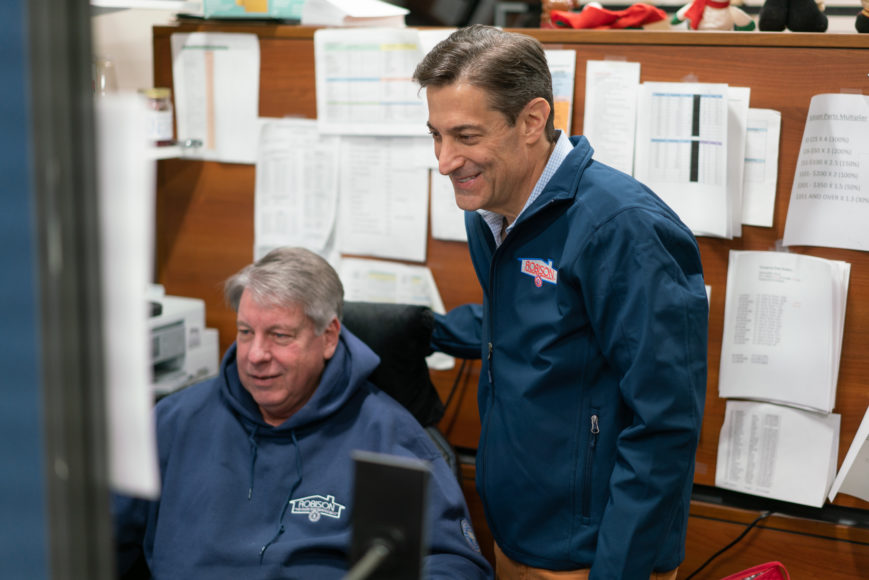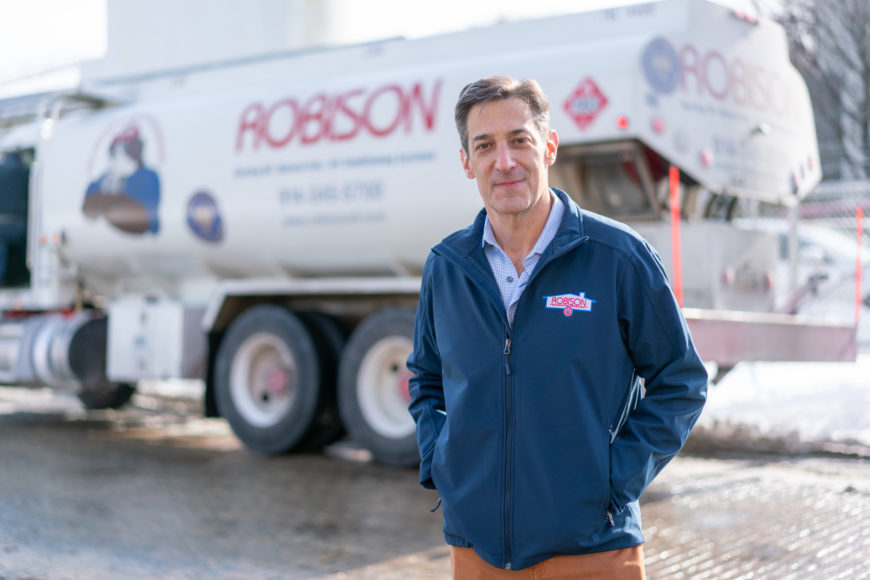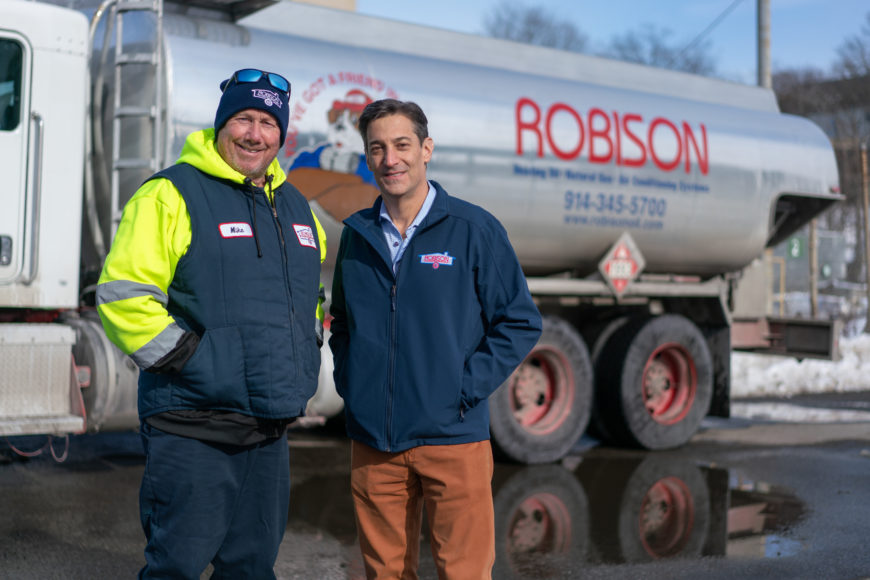Dan Singer is a man made for the moment. As president and CEO of Robison – the Port Chester-based, family-owned home comfort company – he must contend with oil and gasoline prices that have soared, first on the heels of Covid-fueled inflation and then due to the Russian invasion of Ukraine.
What customers and the general public need to understand, he says, is that “we don’t make the products. We have to buy and sell them and are subject to the same volatility and stress as our customers.”
It’s one of the reasons that Robison is about so much more than supplying natural gas and oil – actually biofuel, a clean, renewable blend of heating oil and biodiesel, which is made with vegetable oil (soybean and palm).
“Heating, cooling, air quality solutions, plumbing, electrical: What we like to say is that we provide everything to make you comfortable in your home.”
With the cost of oil and natural gas skyrocketing – up 80% and 60% respectively – Singer is bullish on clean energy. (Indeed the company has trademarked the slogans “Green is the new kosher”; “Green begins at home”; and “Making the world green one home at a time.”)
That green energy includes geothermal heat pumps, which Singer calls a “fascinating technology” that operates on the premise that the ground below Earth’s surface maintains a constant temperature of 55 degrees Fahrenheit. In winter, the pumps draw heat from the ground into your home, reversing the process in summer when they transfer hot air from your home to the ground. Air source pumps work on the same principle, Singer says, transferring warm air out of your home in summer and using air outside the home to warm it in winter.
Air source pumps are less expensive, he adds, but they are also less efficient.
The vast majority of Robison customers in Westchester, Fairfield and Putnam counties use biofuel or natural gas, with the company the largest supplier of biofuel in the area and one of the largest suppliers of natural gas. (Nationwide, half of homes use natural gas; 8%, oil.) Asked which is better, Singer demurs, saying he must remain impartial. According to experts like Bob Vila of PBS’ “This Old House” fame, natural gas is in general cheaper and cleaner but provides less heat per BTU (British Thermal Unit, the U.S. standard heat measurement) than oil and can carry the risk of carbon monoxide and explosion. Keep in mind that to use natural gas as your heat source, you must live in an area that can pipe it into your home. Despite Con Ed installing a large, New York state-mandated main gas line in Scarsdale as part of a new transmission line extending from the Bronx to White Plains, the utility has placed a moratorium on new natural gas connections in all but the northernmost municipalities in Westchester. (Those unaffected by the moratorium include Buchanan, Cortlandt, Croton-on-Hudson, Lewisboro, North Salem, Peekskill, Pound Ridge, Somers and Yorktown.)
Meanwhile, New York state has good news for residents using a bioblend biofuel, offering a 10-cents-per-gallon tax credit for 2021. (That’s $100 on every $1,000 spent.) Robison uses a blend of 10% biofuel in its oil, which qualifies.
Singer sweetens the pot for those customers who purchase biofuel and the company’s 100% green electricity – a free electric vehicle charger. (Singer, a Briarcliff Manor resident, husband and father of three, has driven an electric car for 10 years.) Electricity is just part of Robison’s versatile portfolio, which also includes plumbing, electrical, mold detection and chimney and air-duct cleaning.
Though Robison began in 1921, the Singer family didn’t acquire the business until 1984. By then the Singers had been in the heating business for 57 years, beginning with Singer’s great-grandfather Sol, grandfather Harry, father Saul and brother David.
Singer grew up in Ardsley and graduated from Syracuse University, working for 10 years at PepsiCo in human resources and as manager of labor relations. But Singer – whose personability is immediately apparent in our phone interview – says his interactions were mainly with other executives. The more successful he became, he says, the more removed he became from the people PepsiCo served. Now he heads up a business of 175 employees in which interacting with the customers is vital. The results speak for themselves. In 1984, Robison had 7,000 customers. Today, that number has nearly quadrupled, underscoring the company’s motto, “The House That Service Built.”
Green energy tips from Robison
The average American household spends almost $2,000 a year on utilities. But Robison says you can cut that number by 25 percent with these tips:
- Schedule a home energy and indoor-air quality audit. By ensuring that your home’s ducts, walls, attic surfaces, windows and doors are properly sealed and insulated, you can greatly reduce your home’s energy costs and impact on the environment.
- Replace older energy systems and appliances with Energy Star models. This can cut operational costs and energy dependency significantly.
- Install a programmable thermostat to manage your home’s seasonal temperature requirements more effectively, including reducing the output when no one is home.
- Only run your dishwasher when it is full, and air dry the dishes rather than using the drying cycle. The same goes for clothes washers. Also, hand dishwashing requires only four gallons of water per use, while automatic dishwashing requires 12 gallons.
- Turn off lights, computers and computer monitors in all rooms when not in use.
- Unplug any plugs when not in use (for example, phone and laptop chargers). These items still use electricity while seemingly dormant.
- Lower the thermostat on your hot water heater to 120 degrees Fahrenheit.
- Take short showers instead of baths.
- Clean or replace filters once a month or as recommended by the manufacturers.
- Clean air registers, baseboard heaters and radiators regularly – and make sure they are not blocked by furniture, carpeting or drapes.
- If you have hot-water radiators, bleed trapped air from them once or twice a season.
- Also drain a quart of water from your water tank every three months to remove sediment that impedes heat transfer and lowers efficiency.
- Turn off kitchen, bath or other exhaust fans as soon as you can, within 20 minutes if possible.
- When it’s cold outside, keep the drapes and shades on south-facing windows open during the day to catch sunlight – and closed at night to reduce the chill. When it’s hot outside, keep window coverings closed during daytime to prevent solar heat from increasing your home’s need for cooling.
- Install interior or exterior storm windows to reduce window-heat loss by 25% to 50%.
- Install a whole-house fan to pull cool air through the house and send warm air out through the attic. This can save on alternative air-conditioning costs.
- Don’t place heat-generating items such as lamps and TV sets near your air-conditioning thermostat. The sensor will pick up this nearby heat source and run the AC longer than is necessary.
- Plant trees or shrubs to shade outdoor air-conditioning units, making sure not to bock airflow. If possible, place room air conditioners on the north side of the house. Units operating in shade use up to 10% less electricity than those operating in sunlight.
- Position trees, shrubs or vines to provide shade or windbreaks. This can save up to 25% of the energy required for home-energy use.
- Install aerating, low-flow faucets and showerheads.
- Insulate your electric hot-water storage tank, being careful not to cover the thermostat. The same with your natural gas or heating oil hot-water storage tank, while not covering the top, bottom or burner compartment either.
- Insulate the first 6 feet of the hot- and cold-water pipes connected to your water heater.
- Consider installing a drain water-waste heat recovery system. The United States Department of Energy recently stated that this can save 25% to 30% for water heating.
- Consider installing a natural gas on-demand or tankless water heater. Researchers have found you can save up to 30%, compared to a standard natural-gas, storage-tank water heater.
- Install compact fluorescent light bulbs in your home. They last six to 12 times longer and use far less electricity (saving about $30 per bulb over its lifetime) than incandescent bulbs. They also produce about 75% less heat, which can cut home-cooling costs.
For more, visit robisonoil.com.







